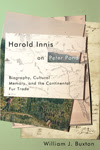The election is over. Revenons à nos moutons.
There are history books coming off the presses. McGill-Queen's UP's Fall 2019 Catalogue has a diverse range of Canadian histories promised, including a fair amount of 19th century and pre-confederation material.
Who knew Harold Innis wrote a biography of the furtrader Peter Pond? Well, not me, but William Buxton did. He's written Harold Innis on Peter Pond
The book explores how Innis's perspectives shifted with changing intellectual and political circumstances and shows that his advocacy of Pond as an unrecognized "father of confederation" challenged conventional views of Canadian nation-building.Since Pond died in 1807, that certainly challenges my conventional view of who is a father of confederation.
Speaking of non-canonical fathers of confederation, M. Max Hamon offers The Audacity of his Enterprise: Louis Riel and the Metis Nation that Canada Never Was, 1840-75.
Questioning the drama of resistance, The Audacity of His Enterprise highlights Riel's part in the negotiations, petition claims, and legal battles that led to the formation of the state from the bottom up. Hamon examines Riel's early successes and his participation in the crafting of a new political environment in the Northwest and Canada.Harry W. Duckworth has edited Friends, Foes, and Furs: George Nelson's Lake Winnipeg Diaries, 1894-22. Nelson has long been championed by Jennifer Brown and others as one of the best fur trade observers of indigenous culture and experience.
Having written a law society history myself, I've a special interest, I guess, in Barry Cahill's exploration into the odd subculture of professional self-governance, Professional Autonomy and the Public Interest: The Barristers' Society and Nova Scotia's Lawyers, 1825–2005.
The Greater Gulf: Essays on the Environmental History of the Gulf of St Lawrence, edited by Clare Elizabeth Campbell and others, explores the historical and geographical contours of "the largest estuary in the world."
Wendat scholar, sage, and activist Georges Sioui publishes Eatenonha: Native Roots of Modern Democracy.
Through an original retelling of the Indigenous commercial and social networks that existed in the northeast before European contact, the author explains that the Wendat Confederacy was at the geopolitical centre of a commonwealth based on peace, trade, and reciprocity. This network, he argues, was a true democracy, where all beings of all natures were equally valued and respected and where women kept their place at the centre of their families and communities.Plus a new biography of Wilder Penfield, Peter Ward on the evolution of the idea of cleanliness in western culture. And much more, but this post is getting long.
Except to note that Paul Wells, covering the election results, writes in Maclean's
That Canada’s politics is overly centralized and reliant on the leader is, by now, beyond dispute. To wit: public administration guru Donald Savoie has just released his 842nd book (an estimate) on the subject.And MGQ has it: Democracy in Canada: The Disintegration of Our Institutions by Donald J. Savoie.

